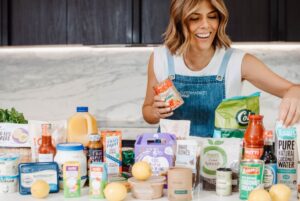National Pharmacies: The Feeding Facts
There wouldn’t be a parent who hasn’t sat at a table exhausted by a fussy toddler or fretted with a baby refusing a bottle or even been in awe of an eleven year old who’s eating the cupboards bare – and wondered whether it’s normal.
At National Pharmacies, our health advisers and pharmacists talk to parents every day about questions that arise around nutrition for children – and what IS normal.
The fact is that each stage of your child’s development can present new challenges, some of those will pass quickly and other’s can cause a lot of stress and worry. The thing to remember is that you can always come into National Pharmacies with your questions and we can offer not just advice on products, but as most of our staff are also parents, we have a lot of practical advice and experience that can help alleviate some of your concerns.

Babies – How do I introduce bottle-feeding / formula?
Breast-feeding is a great start for babies but for a range of reasons, a lot of mothers look to supplement breast-feeding with a bottle of breast milk or alternatively introduce formula. The first thing to remember is, this is okay! Being a mother is about finding the balance that feels right for you and know that at National Pharmacies we will support you in all the options available.
Successfully introducing a bottle and or formula will mean a change from what your baby will be used to so it can be a tricky stage. Each baby is different so the first part will be choosing a brand of bottle and teat shape that they feel comfortable with. To help with this you can expect our staff to ask about whether your baby has a dummy, what your breast-feeding experience has been like and any concerns you may have had along the way. They can then talk you through the options and also the hygiene considerations of using bottles.
Key in this process is knowing that sometimes it can take a couple of different attempts to find the right combination, so consider just buying one bottle and teat as a start with before investing in multiple.

Toddlers – Help! My toddler will only eat crackers and boiled pasta!
Dealing with fussy toddlers can send anyone round the bend and apart from the frustration of all the wasted food, there is also the concern that nutritionally; they aren’t getting what their growing bodies need.
So, what to do? First thing to realise is that it’s highly unlikely that this will be more than just a stage. Most children go through it and eventually a diet that exists of crackers and boiled pasta, just gets boring. Secondly, pick your battles. Turning every mealtime into a stressful time for you and them won’t help. As a family decide on how you are going to approach it and then be consistent. And finally, the triggers that will raise the fussy flag are many and varied and can be individual to each child and even from one day to the next. Ideas that make mealtime fun for children can be great, but can also make food preparation exhausting, try and keep it simple and
if you find something they like, try different versions of that – with a few sneaky extras hidden in! (mix peas into mashed potato for ‘spotty mash’ or hide pretty much anything in home-made sausage rolls).
If you’re worried about your toddlers diet there are also nutritional supplements and formulas that can support your toddler (and you!) through this stage so you can be sure they are getting everything they need.

Children – They say they’re hungry ALL the time!
As children grow, there are definite ‘growth spurts’ and you can sometimes notice these through the weekly food bill! Children, particularly in their late childhood years leading up to becoming a teenager, can consume more food than seems humanely possible.
The trickiest aspect of this time is that left to their own devices most children will gravitate to foods that are ‘quick’ which can lead to unhealthy habits forming. Setting good examples by having plenty of quick healthy options available will help as will possibly going back to an earlier dinnertime to minimise ongoing snacking. Children who are active with sport and other physical activity will need extra snacks to take with them.
But be realistic, most children won’t reach for the carrot and celery sticks no matter how easy you make it for them, so this is where a well planned family meal can make sure a balanced diet is still key. You’ll also have more luck encouraging better choices during the week if there is a point that you sit down and indulge in pizza, burgers or other ‘treat’ food.
If you’re concerned about the amount your child is eating (too much / too little) or what they are eating, speak to one of the health advisers at National Pharmacies and we can help.
And remember, no question is silly and chances are, we will have heard it before!






